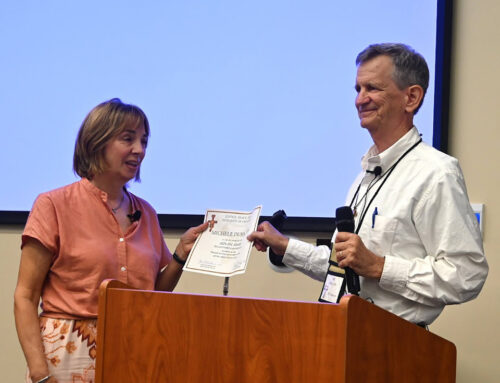
Carolyn Townes, OFS, National JPIC animator, presented Monica Olivera, OFS, with the JPIC award at the virtual Chapter meeting.
(This article originally appeared in the TAU-USA Winter 2021 Issue 102)
By Sharon Winzeler, OFS
Monica Olivera, OFS, is the 2020 recipient of the Justice, Peace and Integrity of Creation (JPIC) Award.
Olivera founded First Nations Outreach that serves remote Native American communities (as far as a 24-hour drive from the home of her Brother Jacoba Fraternity in Lawrence, KS).
Carolyn Townes, OFS, National JPIC animator, presented the annual award at the National Chapter on Oct. 22. “It has been said, where there is a need, there is a Franciscan,” Townes said, calling Olivera’s service “love in action.”
Reaching the Isolated
“I always had a vision to serve the poorest of the poor… I always assumed it was going to be in my country of origin, Peru,” Olivera said. “I never imagined that my journey of faith would lead me to poor, remote communities in America.”
She said the reservations are so remote that many of them do not appear on maps. Yet the need for help is great.
“I was moved when I saw the lack of appropriate clothing in the middle of winter and the lack of accessibility to basic needs,” Olivera said.
After a visit to a Sioux community in South Dakota, she asked for donations from friends and filled a truck with toys and clothing. As First Nations continued its service, members found more isolated reservations in Arizona, Nebraska and Montana. “Our goal is to be led by the Holy Spirit to where we need to go.”
Many of the communities have no stores, restaurants or banks, no access to running water, little medical service and limited job opportunities, Olivera said. Depending on the location, 50-85 percent of adults are unemployed.
Life expectancy is low and there is a high rate of diabetes, addiction, suicide and crime.
Building Trust
“Yet they are people with undisputed strength and profound spirituality,” Olivera said. “They have survived and lived this way for centuries to protect their culture and do not welcome outsiders. It took years to earn their trust to be invited to their communities.”
She said access to the reservation was the first miracle she experienced.
“The second miracle is how, with so little money available, we have been able to bring Christmas to so many.”
What We Do, Not What We Say
“We do not talk about our faith. People understand the Gospel message through what we do rather than what we say,” Olivera said.
“We don’t just collect toys and deliver them. We ask each child what they want for Christmas. We gather them and wrap them with Christmas paper and ribbon,” she said. “We know the gift we bring to them is the only gift they will receive for Christmas.”
Many miraculous interventions have graced the program, according to Olivera. One included fulfilling the expectations of a principal at St. Charles Mission School in Montana. “He made it clear that we could not bring gifts for just one classroom. If we were going to do it, we had to provide them for the entire school of 240 children.”
She returned to Kansas and visited the principal of a local school about sponsorship.
“I asked, ‘how many children would you be willing to sponsor?’ With a big smile on her face, she said, ‘all of them’.”




Leave A Comment